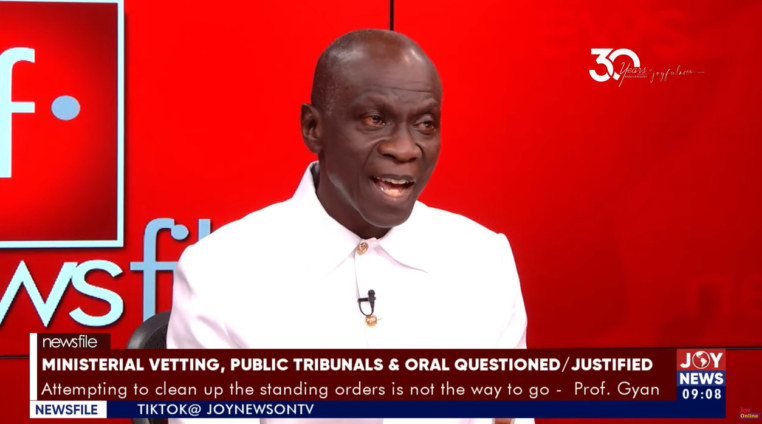
Audio By Carbonatix
Law professor and legal expert, Prof Kwame Gyan, has criticised Ghana’s current system of vetting ministerial nominees, describing it as inadequate and ineffective in assessing the competence and suitability of nominees.
Speaking on JoyNews’ Newsfile on Saturday, January 18, with Samson Lardy Anyenini, Prof Gyan called for reforms to ensure a more rigorous and transparent process.
“We are looking at the technical competence, integrity, and overall suitability of nominees for the roles they’ve been chosen to perform. Yet, the current vetting process does not sufficiently address these criteria,” he remarked.
He emphasised the significance of the process, noting that the collective competence of the 60 ministers to be appointed will shape the destiny of Ghana’s 35 million citizens.
“These 60 people will determine the future of our country and that of unborn generations. If their collective competencies are inadequate, then we are doomed,” he warned.
Prof Gyan highlighted the critical role vetting plays in reassuring the public and international markets. “When nominees like a finance minister are vetted, their responses should demonstrate competence and inspire confidence in their ability to manage key areas like the economy and the cedi. If this doesn’t happen, the markets and speculators will question their capability,” he said.
However, he criticised the current system, which he described as a mere formality. “In Ghana, once the president nominates you, you are essentially a minister. We do not have a history of rejecting vetted nominees. This defeats the purpose of vetting as a rigorous process to assess competency, integrity, and suitability,” he noted.
He also expressed concerns about the omnibus appointments committee, calling it outdated and ineffective. “The omnibus approach is not the way to go. Even with the new standing orders, the process remains flawed. We need to adopt a system that brings out not just integrity but also competency, as seen in the American system,” he suggested.
Prof Gyan advocated for a complete modernisation of the vetting process, proposing that it be treated as a serious job interview.
“These are top-level jobs, and we must ensure the nominees are capable. The rule that allows only two members to ask one question each is insufficient. This process needs to be revised to reflect the seriousness of the positions being filled,” he concluded.
Latest Stories
-
Gomoa-East demolition: 14 suspects remanded by Kasoa Ofaakor Court
8 minutes -
Divers recover bodies of seven Chinese tourists from bottom of Lake Baikal
1 hour -
From windstorm to resilience: How Wa school is growing climate protection
2 hours -
Reclaiming the Garden City: Dr. Kwame Adinkrah urges Kumasi to rein in billboard proliferation
2 hours -
Bursar of Ghanata SHS arrested for alleged diversion of student food supplies
2 hours -
Trump says he will increase global tariffs to 15%
2 hours -
Bogoso-Prestea mine records first gold pour after 24-month shutdown
3 hours -
Ghana–ECOWAS talks end with renewed push for women and youth political inclusion
3 hours -
Interior Minister receives Hudai Foundation food donation for prison inmates during Ramadan
3 hours -
UBIDS to benefit from pre-fabricated US$6.6m 1k capacity classroom project
3 hours -
Interior Minister launches Automated Fire Safety Compliance System to enhance public safety
4 hours -
Africa must lead climate intervention conversation – Experts
4 hours -
Ghana hosts high-level ECOWAS meeting to boost women and youth political participation
5 hours -
Canada looks to trade talks after US Supreme Court tosses Trump’s tariffs
5 hours -
Ghana, Burkina Faso sign 7 cooperation agreements to deepen bilateral ties
5 hours

